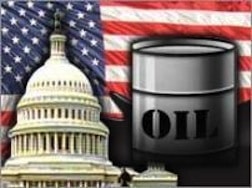As the so-called “Super Committee” works to figure out how to trim $1.2 trillion from the U.S. government’s federal deficit, the dirty energy industry has their lobbyists working overtime to make sure that their billions of dollars in annual subsidies aren’t among the items on the chopping block.
The Super Committee only has until Thanksgiving to submit their proposals to President Obama. And not being ones to miss an opportunity, members on the committee have scheduled dozens of personal fundraisers for their campaigns before that deadline hits. And many of the companies who fear that their subsidies could be cut will be in attendance. After all, the lobbyist blitz contains more than 180 former staffers of members of the Super Committee, so access is not an issue, and no introductions will be necessary.
The New York Times lays out the issue as follows:
Hundreds of lobbyists, including many former Congressional officials and frequent campaign contributors, are making their cases to the committee members.
Ethanol fuel producers, oil companies, corporate jet owners and many other businesses want the committee to guard their own special tax breaks.
“Everybody’s at risk,” said Howard Marlowe, president of the American League of Lobbyists, “and so everyone’s going to be out there lobbying.”
With the lobbying, of course, come valuable campaign contributions. Despite calls from watchdog groups to suspend their fund-raising, most committee members are continuing to raise money from many of the same industries affected by their work.
Business Week outlined some of the tactics being used during these lobbying campaigns:
Industries are employing inventive tactics to get their message across. The Institute for Energy Research, a Washington group that promotes oil and gas development, and its American Energy Alliance advocacy arm are targeting five panel members with a bus tour through Ohio, Pennsylvania, Michigan and Montana. They’re also creating a website and seeking out anti- tax groups such as the Tea Party and Americans for Tax Reform for joint rallies.
The $1.2 trillion that the committee must trim from the budget is to be spread out over the next 10 years, meaning that the total in cuts would amount to roughly $120 billion per year. The dirty energy industry, particularly oil companies, are scared to death that their subsidies will be nonexistent in the years to come after cuts are made.
And they have plenty of reasons to worry. After a bitter fight late last year, and then again in the Spring of 2011, over ending subsidies to multi-billion dollar oil companies, the industry sees that the end is near. After all, these are companies that routinely pull in more than $30 billion a year in profits each, while their entire industry is subsidized by the federal government to the tune of close to $4 billion a year.
These subsidies dwarf the meager amounts given to clean technologies like solar ($457 million a year) and wind ($126 million a year.) When all tax breaks, tax write offs, and subsidies are taken into consideration, the Center for American Progress says that the oil industry is actually reaping a $70 billion a year gift from the government, more than half of what the Super Committee needs to cut per year.
During the battle this past Spring, House Democrats voted in favor of stripping the oil industry’s subsidies, while House Republicans voted unanimously in favor of keeping them in place. The public has sided with the Democrats on this issue, with an overwhelming 74% of Americans in favor of repealing the subsidies.
Another reason the oil industry is living in fear at the moment is because they are aware that the public knows that oil subsidies are not only unfair, but they aren’t necessary. Studies show that repealing oil industry subsidies would not cause the price of gas to increase, nor would it lead to a net loss of jobs. Even former oil CEOs freely admit that oil subsidies are completely unnecessary.
But for now, the lobbying blitz will continue, and given their track record, the Republicans on the committee will more than likely side with the oil companies, and if the price is right, so will the Democrats.
Subscribe to our newsletter
Stay up to date with DeSmog news and alerts






